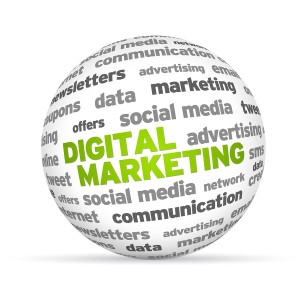 In a world where digital and Internet sources seem to be the same thing, it can be hard for many to understand how web marketing is different from digital marketing. The two terms seem to indicate the same final goal: To improve the visibility of a company on the Internet and leverage the power of the online world for ongoing promotion and praise. That’s not necessarily the case, however. While these terms certainly sound similar, and they often converge when working to promote corporate clients, the truth is that web and digital marketing do differ in some significant ways. Before using the terms interchangeably, it’s a good idea to understand exactly what those differences are and what they mean when pursuing a new marketing strategy, according to author Laura Lake.
In a world where digital and Internet sources seem to be the same thing, it can be hard for many to understand how web marketing is different from digital marketing. The two terms seem to indicate the same final goal: To improve the visibility of a company on the Internet and leverage the power of the online world for ongoing promotion and praise. That’s not necessarily the case, however. While these terms certainly sound similar, and they often converge when working to promote corporate clients, the truth is that web and digital marketing do differ in some significant ways. Before using the terms interchangeably, it’s a good idea to understand exactly what those differences are and what they mean when pursuing a new marketing strategy, according to author Laura Lake.
Think of Digital Marketing as an Umbrella Term, Rather Than a Niche
The first step to understanding the difference between digital marketing and web marketing is to think of digital marketing as a broad term that encompasses a wide variety of sources, websites, devices, and considerations. Digital marketing takes place on virtually any digital device. Marketers who work in this field don’t want to just promote a company on Facebook’s site. They also want to make sure that the company’s message is consistently heard in streaming audio, that it has a mobile-friendly application or website for smartphone users, and that it can sufficiently take advantage of the “Internet of things” that includes all kinds of connected devices.
Digital marketing is a cross-platform, multi-device ideology that believes good promotion happens everywhere instead of just on company or social websites. This approach is increasingly the one preferred by businesses that understand the importance of ubiquity in online advertising, marketing, promotion, and customer retention.
How is Web Marketing a Different Approach, Exactly?
Web marketing isn’t necessarily concerned with the role of smartphones, tablets, or other connected devices. Instead of being concerned primarily with catering to all kinds of platforms and devices, web marketing focuses only on the Internet. This makes it something of a subset of digital marketing. Internet marketers will focus their time and attention on search engine marketing, social media posts and targeted advertisements, content marketing via authoritative website blog posts, and contextual advertising on external websites.
Where the digital marketer wants the company to be present on all devices and within all platforms, the Internet marketer wants the company to be ubiquitous online. Their goal is to make sure that the customer is reminded of the company whether they’re searching on Google, posting a new status update on Facebook, tweeting a trending topic on Twitter, posting an Instagram photo, reading a company blog post, or clicking on ads via third-party websites.
Related Resource: Social Media Marketing
Collaboration: The Key to Marketing Industry Success
Internet marketing and digital marketing are not mutually exclusive options for today’s companies. In fact, they’re complementary services that must both be used in order to fully understand, reach, and interact with the modern consumer. With an ubiquitous online presence, the digital marketer can more easily translate the company into a force to be reckoned with on smartphones and tablets. With a cross-platform presence, Internet marketers get access to more informative, broad demographic data that helps them build even more successful campaigns in the future. Though web marketing is different from digital marketing, their interests are aligned and their strength is when they work together to reach customers more effectively.
